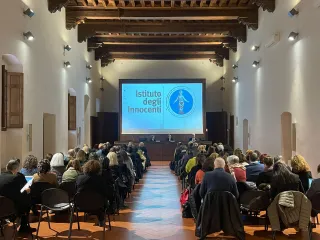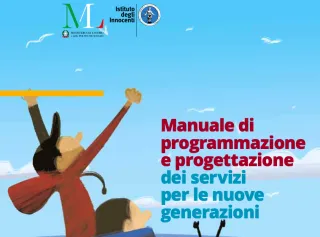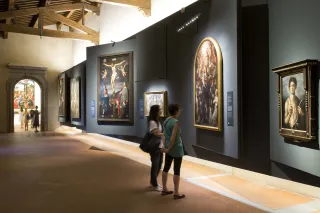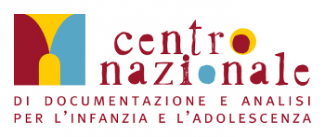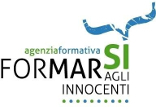Flood in Florence: the Fate of the 200 Innocenti Children in Don Attilio Piccini's Diary
The praiseworthy online exhibition promoted for the 50th anniversary of the disaster is still available
03 November 2023
Area di attività
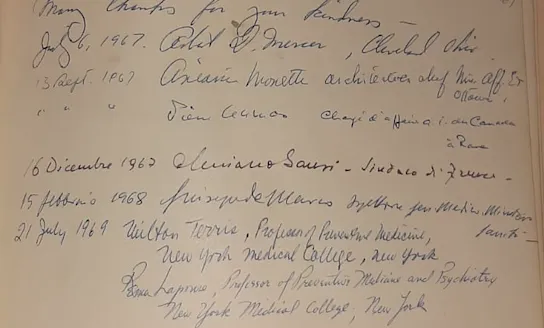
7 o'clock: It's raining heavily. I have celebrated Mass as usual.
8 o'clock: Our deputy farm manager in Figline tells me that a fearsome wave of water has hit our farm. The chicken coop has disappeared, the wine harvest has been destroyed. As a parish priest, I have taken it upon myself to report this event. It is a public holiday and there is no one at the administration offices.
9 o'clock: Reports are coming in that the Arno has overflowed at S. Croce, at the Ponte Vecchio... but there is no cause for alarm here, in Piazza Annunziata. It is pouring and there is a strange silence in the city.
Thus, begins the chronicle of the events of 4 November 1966 written by Don Attilio Piccini, then parish priest of Santa Maria degli Innocenti, the Institute's old church. In his Diary, he narrated in first person the dramatic moments experienced that day by the hospital which, at the time, was hosting over 200 children. On the 50th anniversary of the 1966 flood of the Arno in Florence, theIstituto degli Innocenti commemorated this event through an online exhibition dedicated to the Diary written by Don Piccini. The initiative aimed at reconstructing what happened in those days, when water invaded the lower rooms of the Istituto degli Innocenti, damaging the Brunelleschian premises and sweeping away everything that was necessary to care for the children.
The exhibition is always available on the dedicated web page. It is still a valuable tool to remember the disaster caused by the flood, celebrate the memory of Don Piccini who passed away in 2016, and thank all those who did their best to help the hospital and its little guests.
Don Piccini’s Diary: There Is a Strange Silence in the City
The diary gives us a first-hand account of this tragic event and takes us through 18 days in a city devastated by the flood. On the morning of 4 November, the news initially spread through a few confused rumours. However, within a few hours, around lunchtime, water from the Arno reached the Istituto degli Innocenti. Consternation, car horns, stench of fuel oil, fatigue and fear did not dim the lucidity of the inhabitants of casa Innocenti, who took immediate action and managed to work effectively to immediately reduce the danger to people and contain the damage to the Institute and its artistic heritage. Even before the water was perceived as a real threat to people’s lives, Don Piccini had rescued, almost by himself, some objects from under the church; around 4pm on that first day, when there were serious fears of sudden collapse, some paintings were removed from the waterlogged gallery by the parish priest himself.
With the flooding of the basements, which housed the warehouses and storerooms, huge quantities of food stocks, medicines, clothing and linen, children's dietary products, machinery, and children's equipment were lost. In the days following the drama, volunteers worked in each section trying to salvage what had not been destroyed by the mud and fuel oil. The day after the event, the administration immediately launched an action plan to restore operations.
The Institute's 200 Children
The thoughts of Don Piccini and the staff of the Istituto degli Innocenti were immediately turned to the more than 200 children housed in the facility; of particular concern was the situation of the little ones in the Nido, Divezzi and Guidi sections, located on the ground floor and, therefore, quickly flooded by water. Moving such a large number of children to the higher floors of the Institute was also made possible thanks to the help of citizens who had been stranded in the area.
Once the initial emergency had passed, however, it was necessary to find a solution more suited to their needs: some children were transferred to the Saint Marta Institute in Settignano; 15 infants, on the other hand, were placed at the Princess of Piedmont and Poggio Imperiale Institutes. In order to ensure some normality for the children who stayed behind in the Institute, efforts were also made to resume school lessons for both primary and nursery school children.
Mud Angels
Feelings of empathy and generosity from individuals, companies, organisations and associations also took shape around the Innocenti community. The Diary carefully records food, clothes, medicines, disinfectants, and cash donations from private individuals being constantly sent. It also records the arrival and departure of many young volunteers who were cleaning and disinfecting the flooded premises and the furniture, and retrieving archive materials. The signatures of many of them have been collected and can be seen in the Institute's guest book. The work of the volunteers is in addition to that carried out by the military, the Misericordia, the fire brigade, the Red Cross and, of course, the invaluable efforts of all the Institute staff.
Last update: 01/24/2024 - 13:14

